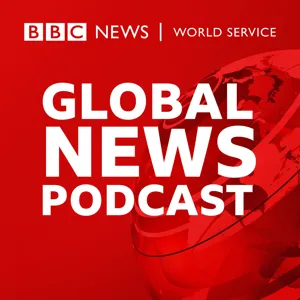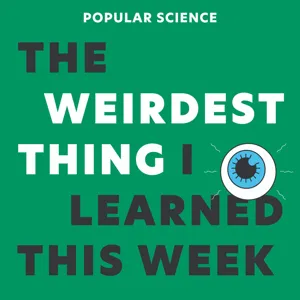Episode 223 - Long COVID

Hosted on Acast. See acast.com/privacy for more information.
Explore "long covid" with insightful episodes like "Episode 223 - Long COVID", "Ep 136 Long Covid: A long time coming", "North America awed by total solar eclipse", "The Fed’s evolving data diet" and "What Do We Understand About Long COVID?" from podcasts like ""The House of Pod: A Medical Podcast", "This Podcast Will Kill You", "Global News Podcast", "Marketplace" and "Consider This from NPR"" and more!

Hosted on Acast. See acast.com/privacy for more information.


A once-in-a-lifetime spectacle was witnessed by millions across the continent. Also: Trump says let US states decide abortion rights, and scientists say Long Covid blood clues could prompt future trials.

“More good data” is what the Fed wants to see before it declares victory over inflation and cuts interest rates. The central bank looks at a lot of data from different sources. And as the economy changes, so do the Fed’s preferences regarding the facts and figures that inform its decisions. Plus, Intel secures $8.5 billion in CHIPS Act funding, Alaska faces looming gas shortages and e-waste holds troves of scarce resources.




Did you know that after the age of 50, more women will have bladder issues than those who don’t? Consultant gynaecologist and urogynaecologist Professor Vik Khullar joins Liz on this episode of the podcast to discuss the impact bladder issues can have - and why women shouldn’t have to suffer in silence.
Liz and Vik discuss how lowering oestrogen levels during perimenopause and menopause can affect the bladder, the potential benefits of topical probiotics, and the key differences between interstitial cystitis and cystitis.
The episode also covers incontinence, vaginal prolapse, the importance of pelvic floor exercises (also known as kegels), mast cells and histamine, plus the connection between Ehlers-Danlos syndrome and bladder issues.
Links mentioned in the episode:
Hosted on Acast. See acast.com/privacy for more information.




Nearly three years after the COVID-19 pandemic began, millions of Americans are still living with the effects of the virus. Neuropsychologists Tracy Vannorsdall, PhD, and Rowena Ng, PhD, talk about the cognitive and mental health symptoms of long COVID, what treatments are available, and the most pressing questions that researchers need to answer to get help to patients who need it.
Links
Tracy Vannorsdall, PhD
Rowena Ng, PhD
Speaking of Psychology Home Page

Dr Li is back on the podcast, I love the way he shares a similar belief in food as medicine and that simple delicious food is key to health. The way he researches, describes and cooks ingredients is testament to his immense knowledge on the subject
William W. Li, MD, is an internationally renowned physician, scientist and author of the New York Times bestseller “Eat to Beat Disease: The New Science of How Your Body Can Heal Itself.” His groundbreaking work has led to the development of more than 30 new medical treatments and impacts care for more than 70 diseases including cancer, diabetes, blindness, heart disease and obesity. His TED Talk, “Can We Eat to Starve Cancer?” has garnered more than 11 million views.
Next year I’ll be having a full length conversation with Dr Li in anticipation of his next book so please enjoy this short conversation with William and Sakina.
🎬 Watch the podcast on YouTube here
📱 Download The Doctor’s Kitchen app for free
You can download The Doctor’s Kitchen app for free to get access to all of our recipes, with specific suggestions tailored to your health needs and new recipes added every month. We’ve had some amazing feedback so far and we have new features being added all the time - check it out with a 14 day free trial too.
Do check out this week’s “Eat, Listen, Read” newsletter, that you can subscribe to on our website - where I send you a recipe to cook as well as some mindfully curated media to help you have a healthier, happier week.
🥗 Join the newsletter and 7 day meal plan
🐦 Tweet me
We would love to get your feedback on the subject matter of these episodes - please do let me know on our social media pages (Instagram, Facebook & Twitter) what you think,and give us a 5* rating on your podcast player if you enjoyed today’s episode.
Hosted on Acast. See acast.com/privacy for more information.

Depending on the data you look at, between 10 and 40 percent of people who get Covid will still have symptoms months later. For some, those symptoms will be modest. A cough, some fatigue. For others, they’ll be life-altering: Debilitating brain fog. Exhaustion. Cardiovascular problems. Blood clotting.
This is what we call long Covid. It’s one term for a vast range of experiences, symptoms, outcomes. It’s one term that may be hiding a vast range of maladies and causes. So what do we actually know about long Covid? What don’t we know? And why don’t we know more than we do?
Dr. Lekshmi Santhosh is an assistant professor at UCSF Medical Center, and the founder and medical director of UCSF’s long Covid and post-ICU clinic. Her clinic opened in May 2020 and was one of the first to focus on treating long Covid patients specifically. We discuss the wildly broad range of symptoms that can qualify as long Covid; the confusing overlaps between Covid symptoms and other diseases; whether age, race, sex and pre-existing conditions affect a person’s chances of contracting long Covid; why it’s so difficult to answer a seemingly simple question like, “How many people have gotten long Covid?”; what to make of a recent study that seemingly undermines the biological existence of long Covid; how worried we should be about correlations between Covid and medical disasters like heart attacks, strokes and abnormal blood clotting; and more.
Mentioned:
“Post–COVID Conditions Among Adult COVID-19 Survivors Aged 18–64 and ≥65 Years — United States, March 2020–November 2021” by Lara Bull-Otterson, Sarah Baca1, Sharon Saydah, Tegan K. Boehmer, Stacey Adjei, Simone Gray and Aaron M. Harris
“Long COVID after breakthrough SARS-CoV-2 infection” by Ziyad Al-Aly, Benjamin Bowe and Yan Xie
“A Longitudinal Study of COVID-19 Sequelae and Immunity: Baseline Findings” by Michael C. Sneller, C. Jason Liang, Adriana R. Marques, et al.
“Positive Epstein–Barr virus detection in coronavirus disease 2019 (COVID-19) patients” by Ting Chen, Jiayi Song, Hongli Liu, Hongmei Zheng and Changzheng Chen
“Risk factors and disease profile of post-vaccination SARS-CoV-2 infection in UK users of the COVID Symptom Study app” by Michela Antonelli, Rose S. Penfold, Jordi Merino, Carole H. Sudre, Erika Molteni, Sarah Berry, et al.
“Understanding and Improving Recovery From COVID-19” by Aluko A. Hope
“Markers of Immune Activation and Inflammation in Individuals With Postacute Sequelae of Severe Acute Respiratory Syndrome Coronavirus 2 Infection” by Michael J. Peluso, Scott Lu, Alex F. Tang, Matthew S. Durstenfeld, et al.
Book Recommendations:
In Shock by Dr. Rana Awdish
Every Deep-Drawn Breath by Wes Ely
Mountains Beyond Mountains by Tracy Kidder
We're hiring a researcher! You can apply here or by visiting nytimes.wd5.myworkdayjobs.com/News
Thoughts? Guest suggestions? Email us at ezrakleinshow@nytimes.com.
You can find transcripts (posted midday) and more episodes of “The Ezra Klein Show” at nytimes.com/ezra-klein-podcast, and you can find Ezra on Twitter @ezraklein. Book recommendations from all our guests are listed at https://www.nytimes.com/article/ezra-klein-show-book-recs.
“The Ezra Klein Show” is produced by Annie Galvin, Jeff Geld and Rogé Karma; fact-checking by Haylee Millikan and Michelle Harris; original music by Isaac Jones; mixing by Jeff Geld; audience strategy by Shannon Busta. Our executive producer is Irene Noguchi. Special thanks to Kristin Lin, Kristina Samulewski, Dr. Ziyad Al-Aly and Lauren Nichols.

Throughout the pandemic, long Covid — symptoms that occur after the initial coronavirus infection — has remained something of a medical mystery.
Now, amid the latest surge of infections, a series of major studies are shedding light on the condition.
Guest: Pam Belluck, a health and science reporter for The New York Times.
Want more from The Daily? For one big idea on the news each week from our team, subscribe to our newsletter.
Background reading:
For more information on today’s episode, visit nytimes.com/thedaily. Transcripts of each episode will be made available by the next workday.

This week, the Centers for Disease Control and Prevention released new data that showed around 60 percent of Americans — more than half of adults and three quarters of children — have now been infected with the coronavirus.
But herd immunity looks likely to remain elusive, and many people are still at high risk from Covid-19.
What do the C.D.C. figures mean for immunity in the United States, and for the future of the pandemic?
Guest: Apoorva Mandavilli, a science and global health reporter for The New York Times.
Want more from The Daily? For one big idea on the news each week from our team, subscribe to our newsletter.
Background reading:
For more information on today’s episode, visit nytimes.com/thedaily. Transcripts of each episode will be made available by the next workday.

Dr. Michael Osterholm is an expert in infectious disease epidemiology, professor, and director of the Center for Infectious Disease Research and Policy. He's also the host of "The Osterholm Update: COVID-19" podcast, and author of multiple books, including "Deadliest Enemy: Our War Against Killer Germs."

You’re six to ten times LESS likely to catch COVID-19 if you’re vaccinated, and thus less likely to infect others. Great! But what about breakthrough cases? Who’s at risk for them? How many folks haven’t gotten vaccinated? Should pregnant people get the ol’ jab, what might happen with transmission rates in 2022, yearly booster questions, the ethics of vaccine distribution, myocarditis, Long COVID, quarantine fatigue and essentially whether the holidays are a good idea.
Follow Jessica Malaty Rivera on Instagram and Twitter
A donation went to Doctors About Borders
Transcripts & bleeped episodes
Become a patron of Ologies for as little as a buck a month
OlogiesMerch.com has hats, shirts, totes, masks…
Follow @ologies on Twitter and Instagram
Follow @alieward on Twitter and Instagram
Sound editing by Jarrett Sleeper of MindJam Media & Steven Ray Morris
Transcripts by Emily White of The Wordary
Website by Kelly R. Dwyer


Hosted on Acast. See acast.com/privacy for more information.
Stay up to date
For any inquiries, please email us at hello@podcastworld.io